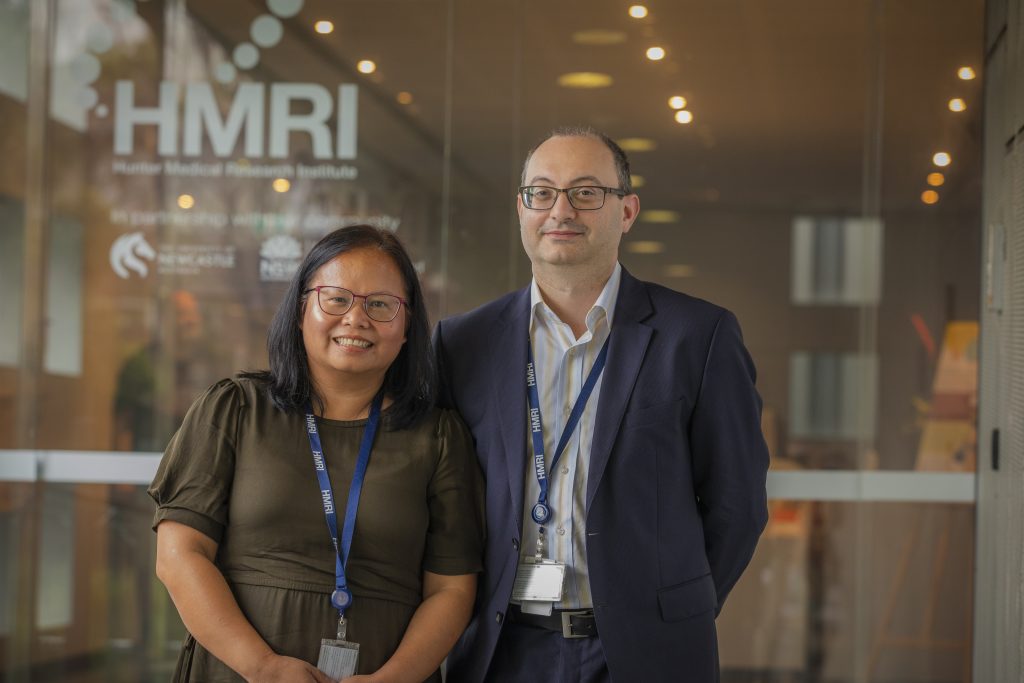Reducing risk of cardiovascular disease after cancer treatment
Cardio-oncology is an emerging field with great potential to improve heart health outcomes and quality of life after cancer treatment.
An estimated one in three Australian people living with cancer will go on to develop cardiovascular disease. To reduce the risks through the prevention and early detection of the impacts of cardiovascular disease on cancer patients, the Office for Health and Medical Research is supporting the work of leading cardiologists.

Two Australian cardio-oncology pioneers
For almost 20 years Professor Doan Ngo and Professor Aaron Sverdlov have worked together on research; jointly publishing over 50 papers and conducting over 70 conference presentations.
Ngo is co-director of the Newcastle Centre of Excellence in Cardio-Oncology research program. She also holds a position in the School of Biomedical Sciences and Pharmacy at the University of Newcastle, and her work aims to improve acute and long-term cardiovascular outcomes in patients with cancer, using an integrative multidisciplinary approach that involves cardiology, oncology, pharmacy and pharmacology. Funding from the Office for Health and Medical Research via an Early-Mid Career Grant has supported Ngo to focus her project on strategies for early detection and prevention of chemotherapy-induced cardiotoxicity in cancer patients.
Sverdlov is a practising cardiologist and clinician-scientist in the Hunter New England Local Health District. He is Director of the Heart Failure Unit in the School of Medicine and Public Health at the University of Newcastle. He also holds a Clinical Academic appointment as a cardiologist at the John Hunter Hospital and is a Clinical Lead of Heart Failure Services for Hunter New England Local Health District.
Along with Ngo, Sverdlov received support from the Office for Health and Medical Research via the Translational Research Grants Scheme (to research improvements for rural and remote patients after hospitalisation for heart failure) and an Early-Mid Career Grant (funding to research cardio protection and treatment approaches to help reverse adverse impacts from treatments for cancer patients). “These grants have assisted me to improve and maintain CVD health, most recently for people along their cancer journey, to mitigate adverse cardiovascular effects of cancer therapies,” Sverdlov explains.
To discuss their collaborative groundbreaking work, the Office spoke to both researchers:
Does cardiovascular disease occur in many cancer patients?
“Roughly two million people live with or beyond cancer in Australia, and a third of them will develop heart disease, which is a figure 40 percent higher than the general population. This makes cardiovascular disease the leading cause of long-term morbidity and mortality among cancer survivors, who number 50 million worldwide.”
When did cardio-oncology emerge?
“In the last two decades, cardio-oncology has gained momentum, with establishment of specialised clinics and programs in major medical centres and the fostering of collaboration between oncologists and cardiologists. Pioneering work in the field has focused on understanding and managing these cardiotoxic effects as more patients survive cancer due to treatment advances, but experience heart-related side effects from chemotherapy, radiation, and targeted therapies.”
Which cancer patients are most at risk of cardiovascular disease?
“The increased risk of cardiovascular mortality in the cancer patient population is observed across all cancer types. This is a result of cardiotoxic treatments and shared risk factors (for example, hypertension, smoking, obesity, diabetes mellitus and diet).”
What are some outcomes of your work?
“We have set up the largest public cardio-oncology program in Australia. It was also the first to be accredited as a Gold Tier (top level) Cardio-Oncology Centre of Excellence, in 2021, by the International Cardio-Oncology Society. Clinically, we have identified that a substantial proportion of patients diagnosed and treated with cancer develop a variety of asymptomatic cardiometabolic abnormalities. These include elevated blood pressure, high blood sugars and lipid abnormalities (such as high cholesterol), that persist beyond treatment and significantly increase cardiovascular risk. We found that a significant proportion of these patients develop elevation of cardiac enzymes during treatment. The effect of these changes is unknown and is the subject of the ongoing research by our group.”
What promising potential treatments have you identified?
“Our research, supported by the Office for Health and Medical Research, has identified that Olaparib, a drug used to treat ovarian cancer, can protect the heart from effects of a commonly used chemotherapy. That form of chemotherapy is called doxorubicin and it can be cardiotoxic. Our related work has led to an international patent, ongoing industry collaboration and funding and clinical trials slated for early next year, pending ethics approval.”
Updated 5 months ago